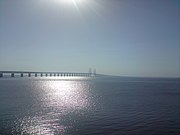Sweden has a population of 9,400,000 in 2010. At 450,295 km², Sweden is the third largest country in the European Union in terms of area, and it has a total population of about 9.2 million.
Sweden is a constitutional monarchy with a parliamentary system of government and a highly developed economy. It ranks first in the world in The Economist's Democracy Index and seventh in the United Nations' Human Development Index. Sweden has been a member of the European Union since 1 January 1995 and is a member of the OECD.
Most of Sweden has a temperate climate, despite its northern latitude, with four distinct seasons and mild temperatures throughout the year. The country can be divided into three types of climate; the southernmost part has an oceanic climate, the central part has a humid continental climate and the northernmost part has a subarctic climate. However, Sweden is much warmer and drier than other places at the similar latitude, and even somewhat further south, mainly because of the Gulf Stream.
 |  |  |
 |  |  |
Sweden is an export-oriented mixed economy featuring a modern distribution system, excellent internal and external communications, and a skilled labour force. Timber, hydropower, and iron ore constitute the resource base of an economy heavily oriented toward foreign trade. Sweden's engineering sector accounts for 50% of output and exports. Telecommunications, the automotive industry and the pharmaceutical industries are also of great importance. Agriculture accounts for 2 percent of GDP and employment.
The 20 largest (by turnover in 2007) companies registered in Sweden are Volvo, Ericsson, Vattenfall, Skanska, Sony Ericsson Mobile Communications AB, Svenska Cellulosa Aktiebolaget, Electrolux, Volvo Personvagnar, TeliaSonera, Sandvik, Scania, ICA, Hennes & Mauritz, Nordea, Preem, Atlas Copco, Securitas, Nordstjernan, and SKF. Sweden's industry is overwhelmingly in private control; unlike some other industrialized Western countries, such as Austria and Italy, publicly owned enterprises were always of minor importance.
No comments:
Post a Comment